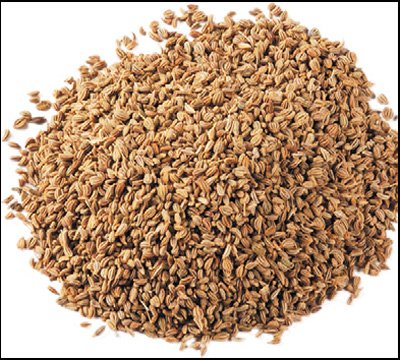Ajmoda
Ayurvedic Medicine

Ajmoda
Celery seed:
As with all members of the Umbelliferae family with their ascendant flower and seed heads, this is a digestive 'lightener'. Its pungency and aromatic nature activate the digestive process and make light work of heavy food. Literally meaning 'goat's delight', ajmoda is a delicious shrub.
Lungs Asthma, bronchitis, cough, sinus congestion. It actively helps to dilate the bronchioles by preventing spasm in the airways. It positively affects the flow of prana and udana vayu. Excess mucus accumulation, a sign of aggravated avalambaka kapha is 'digested' . Digestion Flatulence, borborygmus and intestinal cramps. Low agni is stimulated by the pungent volatile oils. Samana vayu is regulated and apana vayu encouraged to flow freely downwards. It encourages the natural downward movement of digestion (Tierra 1988). Nerves Spasms, cramps and muscular tension. Obstructed vata is released by reducing tension throughout the whole nervous system; this directly regulates the tension versus relaxation balance in the smooth muscles. Ajmoda benefits heart pain caused by nervous constriction . As an antispasmodic with an affinity for the lower abdomen it can also help ease the pain of dysmenorrhoea and menstrual cramps. Urine Ajmoda seed is a specific herb for treating kidney and bladder discomfort from cold; frequent, pale urine with lower backache and nocturia . Caution should be observed in kidney inflammation as the volatile oils may cause irritation (BHMA 1992). Conversely, the vegetable 'stalk' heals the urinary system afflicted with problems from heat, such as urinary irritation, cystitis, pain and frequent, dark urination with burning. Joints Ajmoda is a specific herb for rheumatism, arthritis and gout. It directly reduces pain by assisting excretion of inflammatory ama toxins via the mutravahasrotas.
 Myrrh
Myrrh Hemp Seed
Hemp Seed Kushtha
Kushtha Vidari
Vidari Cardamom
Cardamom Kanchanara
Kanchanara Anthrapachaka
Anthrapachaka Safed Musali
Safed Musali Shankhapushpi
Shankhapushpi Bhumiamalaki
Bhumiamalaki Neem
Neem Aragvadha
Aragvadha Test your English Language
Test your English Language  Benefits of Star Apple
Benefits of Star Apple Lata Mangeshkar
Lata Mangeshkar What to Eat in Manipur
What to Eat in Manipur Learn to Swim
Learn to Swim Christmas Poems
Christmas Poems Barack Obama
Barack Obama Promise Day
Promise Day Best Cities for young People
Best Cities for young People Best Cricketer
Best Cricketer




